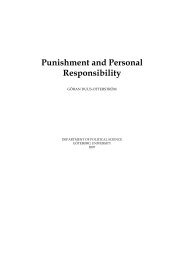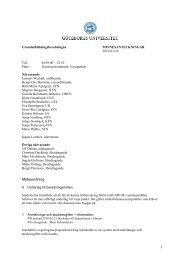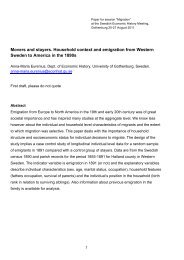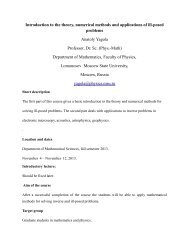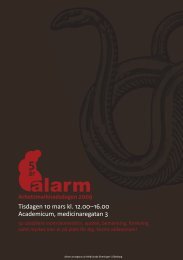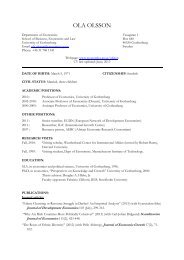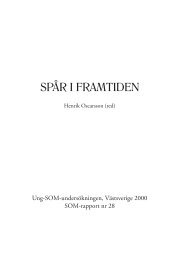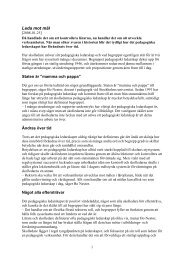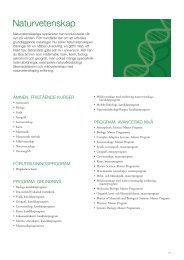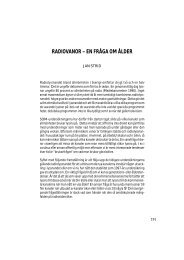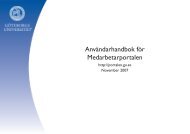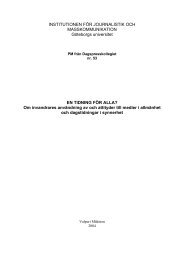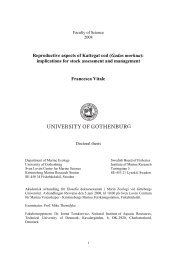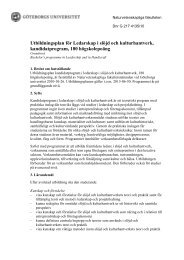Guide for VisitinG staff
Guide for VisitinG staff
Guide for VisitinG staff
Create successful ePaper yourself
Turn your PDF publications into a flip-book with our unique Google optimized e-Paper software.
<strong>Guide</strong> <strong>for</strong><br />
Visiting Staff
Photo: Carina Elmäng, Johan Wingborg
<strong>Guide</strong> <strong>for</strong> Visiting Staff<br />
Welcome to Gothenburg and to our University. I really hope<br />
that your stay here will meet your expectations or even<br />
exceed them.<br />
Since living in a new country can be quite a challenge, at<br />
least in the beginning, we have put together a booklet with<br />
advice and in<strong>for</strong>mation that may make your everyday life a<br />
bit easier. I hope you will find it useful.<br />
Pam Fredman<br />
Vice-Chancellor<br />
More in<strong>for</strong>mation at www.gu.se/guestservices
Contents<br />
4<br />
Planning your stay 7<br />
Permits 8<br />
Accommodations 9<br />
Insurance 9<br />
Travel 11<br />
Family and schools 11<br />
Life in Sweden 12<br />
Getting settled 15<br />
Civic registration 16<br />
ID card 16<br />
Income taxes 16<br />
At the University 17<br />
Banks 18<br />
Postal services 18<br />
Phone 19<br />
Internet and e-mail 19<br />
GU card 19
Living in Gothenburg 21<br />
Health and medical care 22<br />
Leisure 24<br />
Local transportation 25<br />
5<br />
Useful in<strong>for</strong>mation 27<br />
Faculties at the 33<br />
University of Gothenburg
Planning your stay<br />
7
8<br />
Permits<br />
EU citizens<br />
As an EU/EEA citizen, you have the right to work in Sweden<br />
without a work or residence permit. The same applies to your family members<br />
if they join you. You and your family members are entitled to begin working<br />
immediately. If you stay longer than three months, you have to register with<br />
the Swedish Migration Board, www.migrationsverket.se<br />
Non-EU citizens<br />
A visa is required <strong>for</strong> researchers from certain countries and regions. It is issued<br />
<strong>for</strong> short-term visits and must be applied <strong>for</strong> be<strong>for</strong>e entering the Schengen<br />
area (including Sweden). Visiting researchers do not need a work permit. Note<br />
that if you are a visiting researcher, you still need a residence permit if your stay<br />
is expected to last longer than three months. To receive a residence permit,<br />
you need to have a hosting agreement with the host university. If residence<br />
permit is granted, you will be given a residence permit card. The card is proof of<br />
your residence permit. More in<strong>for</strong>mation about permits, visas and application<br />
<strong>for</strong>ms can be found at www.migrationsverket.se<br />
If you would like help from the University in these matters, please contact<br />
Guest Services, www.gu.se/guestservices
Accommodations<br />
The University of Gothenburg offers a large number of different and centrally<br />
located guest rooms and apartments. They are furnished and equipped <strong>for</strong><br />
self-catering, and are administrated by Guest Services. We also provide you<br />
transportation upon arrival to the guest rooms/apartments and we assist in<br />
practical matters concerning your stay. www.gu.se/guestservices<br />
9<br />
Insurance<br />
Healthcare in Sweden is very expensive unless you are covered by some kind<br />
of insurance. If your spouse/cohabitant and/or children accompany you to<br />
Sweden, they too need to make sure that they have some <strong>for</strong>m of healthcare<br />
coverage in Sweden. To read more about healthcare in Sweden, please download<br />
an in<strong>for</strong>mative text from the Swedish Social Insurance Administration at<br />
www.<strong>for</strong>sakringskassan.se<br />
EU citizens<br />
Regarding social security and health related matters, you are covered as soon<br />
as you register as a resident with the Swedish Migration Board. Your entitlement<br />
to some benefits (e.g. sickness benefit) depends on whether or not you<br />
are employed and pay taxes in Sweden. You will have access to public medical<br />
services if you register be<strong>for</strong>ehand at a social insurance office in your home
country and obtain a European Health Insurance Card. You need to bring the<br />
card with you when seeking medical attention in Sweden.<br />
10<br />
Non-EU citizens<br />
• Staying less than one year.<br />
If your residence permit is <strong>for</strong> less than a year, you cannot be listed in the<br />
Swedish civil registry, rendering you ineligible <strong>for</strong> Swedish healthcare benefits.<br />
Instead you have to make arrangements <strong>for</strong> health insurance coverage <strong>for</strong> the<br />
duration of your stay in Sweden be<strong>for</strong>e you arrive, either with an insurance<br />
company in your home country or through the University by means of a GIF<br />
insurance (GIF-försäkring). However, <strong>for</strong>eign citizens may be eligible <strong>for</strong> medical<br />
benefits under certain conditions. Check with your home social security or<br />
insurance office be<strong>for</strong>e you leave.<br />
• Staying one year or more.<br />
If you have a residence permit <strong>for</strong> a year or more, you are eligible <strong>for</strong> the same<br />
healthcare benefits as Swedes. However, you are not covered until you register<br />
at a local tax office (see under Getting Settled). It is there<strong>for</strong>e advisable that you<br />
get some <strong>for</strong>m of travel/medical insurance in your home country <strong>for</strong> your first<br />
few days in Sweden. If you receive a scholarship or stipend (other than from a<br />
Marie Curie fellowship), you will not be required to pay taxes in Sweden. In this<br />
case, there might be some limitations in the social security, <strong>for</strong> example with
espect to sick leave allowance and parental leave allowance. This applies even<br />
if you are expected to stay in Sweden <strong>for</strong> a year or longer.<br />
Insuring your belongings<br />
Concerning your personal belongings, it is strongly recommended that you<br />
purchase <strong>for</strong> example a home insurance.<br />
11<br />
Travel<br />
There are two airports in Gothenburg: Göteborg Landvetter Airport and Göteborg<br />
City Airport, www.swedavia.se. You can also reach Gothenburg by ferry,<br />
www.aferry.se, or by train, www.sj.se<br />
Airport buses operate between the airports and the Gothenburg Central Station.<br />
You can either buy your ticket online at www.flygbussarna.se pay by SMS<br />
or pay with a major credit card on the bus or using the ticket machines at the<br />
airports.<br />
Family<br />
If you plan to bring your family to Gothenburg, they may also need a visa or<br />
a residence permit, depending on their citizenship and length of stay. They<br />
also need to make sure that they have some <strong>for</strong>m of healthcare coverage in<br />
Sweden. If your spouse wants to work while you are in Sweden, you can find
asic and general in<strong>for</strong>mation in English about living and working conditions in<br />
Sweden on www.eures.se<br />
12<br />
Pre-schools and schools<br />
If you have children, you should locate a pre-school or school as early as<br />
possible. There is a list of international pre-schools and schools in and around<br />
Gothenburg in the Expat <strong>Guide</strong> at www.businessregiongoteborg.com.<br />
Guest Services can assist with more in<strong>for</strong>mation regarding your stay in<br />
Gothenburg, www.gu.se/guestservices<br />
Life in Sweden<br />
Sweden is the third largest country in Western Europe with a population of<br />
about 9.4 million, of which a majority live in the southern parts. The country is<br />
characterized by its long coastlines, large <strong>for</strong>ests and numerous lakes. In southern<br />
Sweden, the winters are shorter than in most other areas of Sweden, but<br />
nevertheless quite cold. Summer temperatures are normally 20-25º C. Due to<br />
the high latitude, we have very long hours of daylight in the summer and very<br />
long nights in the winter.
Sweden has a position in Europe, and the world, as a modern and safe country<br />
with a reputation <strong>for</strong> being competitive and innovative. It has one of the<br />
highest standards of living in the world and a respected system of democracy<br />
and individual rights. Most Swedes are able to speak English.<br />
Read more about Sweden and Swedes at www.sweden.se and at<br />
www.visitsweden.com<br />
13
Getting Settled
16<br />
Civic registration<br />
When registered with the Migration Board, or when you have a residence permit<br />
valid <strong>for</strong> a year or longer, your next step should be to register as a resident<br />
at the nearest office of the Swedish Tax Agency (Skatteverket). Once you do so,<br />
you are eligible <strong>for</strong> Swedish healthcare benefits and you will receive a unique<br />
10-digit personal identification number (personnummer). You will be able<br />
to use this number to simplify a whole range of transactions in the Swedish<br />
society, such as acquiring an identity card, opening a bank account and visiting<br />
a doctor. You can find more in<strong>for</strong>mation in both Swedish and English at<br />
www.skatteverket.se<br />
ID card<br />
ID cards are issued by the Swedish Tax Agency. You can find in<strong>for</strong>mation about<br />
how to apply on their website at www.skatteverket.se/privat/idkort/idcard<br />
Income taxes<br />
In Sweden, income taxes are almost always automatically submitted to the tax<br />
authority, since employers are obliged to deduct taxes from salaries paid to the<br />
employees. We strongly advise you to contact a tax consultant or the national<br />
tax authority in your home country be<strong>for</strong>e travelling to Sweden. Remember, if<br />
you are on a scholarship and do not pay income taxes, you will not be eligible<br />
<strong>for</strong> healthcare and other benefits.
There are some exceptions to the regular tax system, e.g. tax relief <strong>for</strong> <strong>for</strong>eign<br />
key personnel, see www.<strong>for</strong>skarskattenamnden.se, and a special income tax<br />
<strong>for</strong> non-residents (SINK), see in<strong>for</strong>mation at www.skatteverket.se<br />
At the University<br />
Your host Department will see to it that you have a work space, along with an IT<br />
account that enables you to access the Internet, e-mail and the University server.<br />
If you are employed by the University, you will receive in<strong>for</strong>mation from the<br />
Department of Human Resources concerning e.g. payment of salaries, hours of<br />
work, insurance and pensions, work environment and equality matters.<br />
www.pa.adm.gu.se/english<br />
17<br />
Security<br />
The University of Gothenburg conducts active security work and risk management.<br />
The security work must prevent risks and damage through cost-effective<br />
security solutions within IT security, physical security, personal security,<br />
administrative security and preparedness <strong>for</strong> emergency and crisis. Read more<br />
about this at www.sakerhet.gu.se/english
18<br />
Banks<br />
Different banks have different conditions <strong>for</strong> opening an account. The bank<br />
will require the following documentation when opening an account <strong>for</strong> you:<br />
A valid passport and the <strong>for</strong>m Certificate <strong>for</strong> guest professor or scholarship<br />
holder, which you can get from your department. This certifies your address in<br />
Sweden and your address in the country of residence.<br />
Postal services<br />
To receive letters and packages, your address must include your name,<br />
street, apt no and postcode. Larger packages must be collected at designated<br />
locations, e.g. selected food stores and petrol stations.<br />
www.posten.se
Phone<br />
Mobile telephones are widely used in Sweden. Visiting <strong>staff</strong> at the University<br />
are offered the possibility to borrow a mobile phone during their visit. The<br />
mobile phone can be used not only <strong>for</strong> telephone calls but also to buy tickets in<br />
the local public transportation system. www.gu.se/guestservices<br />
19<br />
Internet and e-mail<br />
Most airports, train stations, public libraries and hotels provide computers<br />
with Internet access. There are also various Internet cafés. In the apartments<br />
and rooms provided by Guest Services, Internet connection is included in the<br />
accommodation fee.<br />
GU-card<br />
All University of Gothenburg<br />
<strong>staff</strong> will receive an ID card that can<br />
be used <strong>for</strong> example as a keycard,<br />
library card and photocopier card on<br />
University premises.
Living in Gothenburg
22<br />
Gothenburg is spelled Göteborg and pronounced [yuhteborg] in Swedish. It is<br />
Sweden’s second largest city and has half a million inhabitants. It is beautifully<br />
situated on the Swedish west coast. Read more in<strong>for</strong>mation about the city at<br />
www.goteborg.com and www.goteborg.se<br />
Health and medical care<br />
In<strong>for</strong>mation and counselling<br />
The Medical In<strong>for</strong>mation Service (Sjukvårdsrådgivningen), telephone: +46 1177,<br />
is a 24-hour provider of free healthcare in<strong>for</strong>mation and consulting. There are<br />
local medical care centres (Vårdcentral) all over Gothenburg. They are listed in<br />
the phone book (blue section) and at www.vgregion.se<br />
In case of emergency – dial 112. This is the emergency number <strong>for</strong> ambulance,<br />
police and rescue and fire brigade. You will be asked to explain what has happened<br />
and to state your location.<br />
There are emergency rooms (akutmottagning) at the Sahlgrenska University<br />
Hospital <strong>for</strong> adults and at Drottning Silvias Barn- och Ungdomssjukhus <strong>for</strong><br />
children.
Health services at the University<br />
Regarding work-related health concerns, employees at the University of<br />
Gothenburg may turn to Previa, www.previa.se/GU. All visits require an<br />
appointment.<br />
23<br />
Pharmacies<br />
Non-prescription medicines, such as aspirin and cough syrup, are sold at<br />
pharmacies and at some supermarkets, grocery stores and petrol stations. A<br />
doctor’s prescription is required <strong>for</strong> stronger medications such as antibiotics.<br />
These medicines can only be obtained from a pharmacy (apotek).<br />
Dentists<br />
All medical districts have a dental clinic (Folktandvården), usually located in the<br />
same area as the medical care centre (Vårdcentral). There is also a wide range<br />
of private dentists listed in the telephone directory. Dental care costs are partially<br />
subsidised if you are registered in the Swedish social insurance system.
24<br />
Leisure<br />
Everything is close at hand in Gothenburg. In fact, most things are within<br />
walking or cycling distance. The sea and several beaches are within a couple of<br />
kilometres from the city, as are extensive nature reserves and leisure areas. The<br />
city has gained an international reputation <strong>for</strong> innovative cuisine using local<br />
produce, mainly north Atlantic fish and shellfish. Liseberg in central Gothenburg<br />
is Northern Europe’s largest and most beautiful amusement park, and<br />
one of Sweden’s most popular attractions. In<strong>for</strong>mation about Gothenburg and<br />
what’s going on in the city is published at www.goteborg.com<br />
The Expat <strong>Guide</strong> “Get Local” at www.businessregiongoteborg.com has<br />
updated in<strong>for</strong>mation about churches, clubs and associations <strong>for</strong> expats.<br />
Guest Services arranges various activities such as guided town walks, in<strong>for</strong>mal<br />
meetings and excursions. See the webpage calendar <strong>for</strong> more in<strong>for</strong>mation.<br />
www.gu.se/guestservices
Local transportation<br />
The local public transportation system is operated by Västtrafik and consists<br />
of buses, trains, trams and ferries. Find more in<strong>for</strong>mation about tickets and a<br />
journey planner at www.vasttrafik.se You cannot buy tickets from the driver.<br />
Instead, you need to buy your ticket from the Tidpunkten shop, from newsagents<br />
such as Pressbyrån, from 7-Eleven or from any other store or shop<br />
displaying the Västtrafik sign. You can also buy tickets by text message (if you<br />
have a Swedish mobile phone operator). The time schedule is very reliable and<br />
there are seldom delays. Some regional and airport buses will allow you to pay<br />
by credit card, or you can buy tickets in advance on the Internet.<br />
25
Useful in<strong>for</strong>mation
28<br />
Associations<br />
The Gothenburg region has many clubs and associations, bringing international<br />
visitors and residents together <strong>for</strong> the purpose of support, companionship and<br />
friendship. See the The Expat guide “Get Local” at<br />
www.businessregiongoteborg.com<br />
Bank hours<br />
Banks are generally open Monday through Friday 10 am-3 pm. Many branch offices<br />
have additional opening hours in the late afternoon at least once a week.<br />
Clothing<br />
The weather in the southern part of Sweden is cold from November to March.<br />
You will need winter clothing (coat, gloves, warm shoes, etc.) <strong>for</strong> this part of the<br />
year. At the University, the general dress code <strong>for</strong> most events is smart casual.<br />
The conferment of doctoral degrees is an exception to this.<br />
Driving in Sweden<br />
Sweden, like most other European countries, has right-hand traffic. You must<br />
bring your driving licence whenever you drive.
Electricity<br />
Sweden uses 230V AC, 50 Hz.<br />
Emergency<br />
In the event of an emergency, dial 112 and ask <strong>for</strong> ambulance services, the fire<br />
department or the police.<br />
29<br />
News<br />
SR International is the international and multicultural service of state-owned<br />
national radio broadcaster SverigesRadio. http://sverigesradio.se/international/.<br />
See www.thelocal.se <strong>for</strong> news about Sweden in English, and<br />
www.goteborgdaily.se <strong>for</strong> news about Gothenburg.<br />
Post offices<br />
Nowadays, post offices are integrated into various shops, grocery stores, petrol<br />
stations etc. You can use them to send packages and buy stamps. The opening<br />
hours differ according to the specific stores they are in. Generally, they are<br />
open during normal shopping hours, but local variations may occur. Look <strong>for</strong><br />
the blue postal sign with the yellow bugle.
30<br />
Public holidays<br />
A list of important Swedish holidays can be found at<br />
www.sweden.se. Most Swedes have the holidays off, including many civil<br />
servants, bank employees, public transport workers, hospital <strong>staff</strong>, shop<br />
assistants and media workers.<br />
Religion<br />
More than 80% of the Swedish population belong to the Evangelical Lutheran<br />
Church. The Expat <strong>Guide</strong> ”Get Local” at<br />
www.businessregiongoteborg.com has a list of different churches represented<br />
in Gothenburg.<br />
Researchers<br />
Euraxess Sweden offers practical in<strong>for</strong>mation concerning research and daily<br />
life in Sweden. It also offers guidance to researchers searching <strong>for</strong> work and<br />
research funding opportunities in Sweden and Europe. www.euraxess.se
Telephone<br />
The international country code <strong>for</strong> Sweden is 46. The area code <strong>for</strong> Gothenburg<br />
is (0)31. To call abroad from Sweden, dial 00 followed by the country code.<br />
Time<br />
GMT 1. Time is written according to the European system. For example, 2 pm is<br />
written 14.00. Daylight saving time is used, i.e. the clocks are moved <strong>for</strong>ward<br />
1 hour at 2 am on the last Sunday of March and are moved back to normal time<br />
at 2 am on the last Sunday of October.<br />
Dates are often written in the following order: year, month, day, e.g. 12 October<br />
2009 is written 2009-10-12 (or just 091012), or 12/10 2009. American visitors in<br />
particular should take note that 12/10 does not mean the 10th of December.<br />
31
Faculties at the<br />
University of Gothenburg
Sahlgrenska Academy (Medicine, Odontology and Health and Care Sciences)<br />
www.sahlgrenska.gu.se/english<br />
34<br />
Faculty of Science<br />
www.science.gu.se/english<br />
Faculty of Arts<br />
www.hum.gu.se/english<br />
Faculty of Fine, Applied and Per<strong>for</strong>ming Arts<br />
www.konst.gu.se/english<br />
Faculty of Social Sciences<br />
www.samfak.gu.se/faculty_of_social_science<br />
School of Business, Economics and Law<br />
www.handels.gu.se<br />
Faculty of Education<br />
www.ufn.gu.se/english<br />
The Board of Teacher Education<br />
www.lun.gu.se/english<br />
IT Faculty<br />
www.itufak.gu.se
We reserve the right to make changes. Guest Services at the University of Gothenburg April 2012



